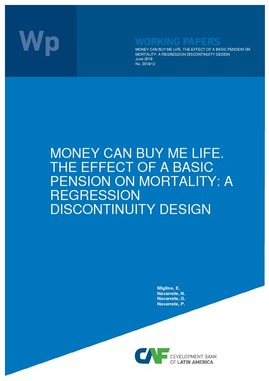Money can buy me life. The Effect of a Basic Pension on Mortality: a Regression Discontinuity Design
Resumen
This paper estimates the effect of a permanent income increase for the elderly on their health outcomes. Our regression discontinuity design exploits an eligibility cutoff in a Chilean basic pension program that grants monthly payments of 40 percent of the minimum wage to pensionless retirees. Four years after applying pension, recipients are 2.5 percentage points less likely to die, with lower incidence of respiratory and circulatory diseases. The effect is concentrated on pension recipients living without working-age relatives, who have more children if living with recipients. This seems explained by pre-existing income transfers from working-age relatives to retirees, which cease when payments begin. Results suggest that increasing income for older individuals could reduce health inequalities across income groups, and mitigate the inter-generational transmission of poverty by alleviating the financial burden imposed on younger relatives.
Materia
País / Región
Fecha
2018-06-12Citar de esta publicación
Item perteneciente a la Colección

Autor
Miglino, EnricoNavarrete H., Nicolas
Navarrete H., Gonzalo
Navarrete H., Pablo

